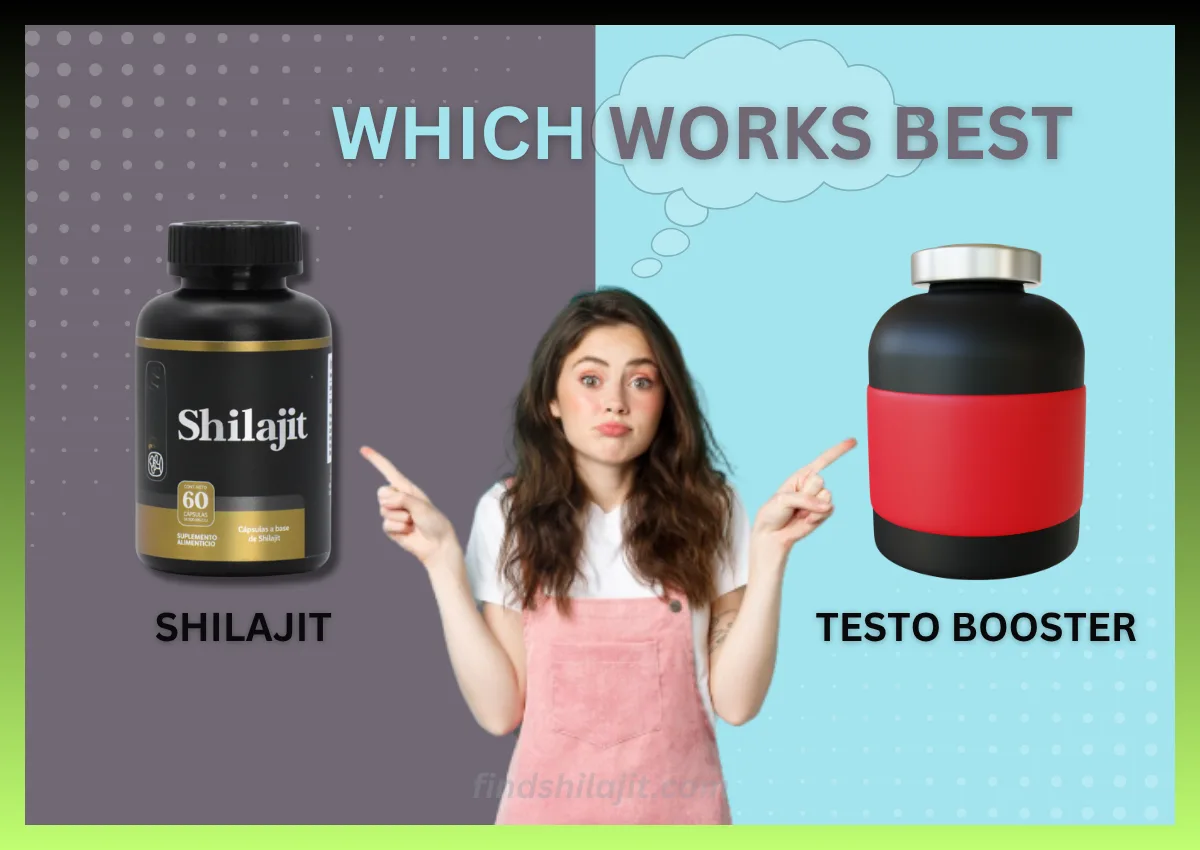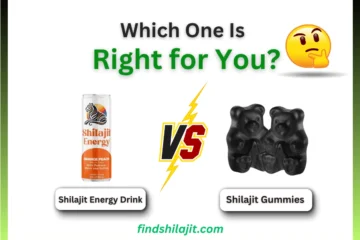If you are looking to enhance your performance, stamina, and overall vitality, you might be wondering: Does Shilajit increase testosterone? The answer is yes, but with so many testosterone boosters on the market promising similar results, it can be hard to know what truly works for you.
But with so many testosterone boosters available now, such as Sea Moss, Maca Root, D-Aspartic Acid, Tribulus, and Ashwagandha—how do you know which actually works for you?
In this blog, we’ll break down the science behind Shilajit, compare it with other popular testosterone boosters, and provide a clear Shilajit vs testosterone boosters analysis to help you make an informed choice for your health and fitness goals.
What is Shilajit?
Shilajit is a potent resin sourced from the rocky heights of the Himalayas and the Altai Mountains in the world.
It’s packed with fulvic acid, humic acid, minerals, and amino acids. Ayurveda has used it for centuries as a rejuvenating tonic.
Beyond testosterone support, it fuels stamina and endurance. It sharpens mental clarity and focus naturally.
Shilajit also helps slow aging and supports overall vitality. For best results, always choose pure Shilajit and verify its authenticity with simple home-made testing methods.
How Shilajit Affects Testosterone
Scientific studies show Shilajit can naturally raise testosterone levels in men. It works by stimulating luteinizing hormone, which signals the testes to produce more testosterone.
Additionally, Shilajit reduces cortisol, the stress hormone that can suppress testosterone, while providing antioxidant support to protect testicular cells from oxidative damage.
Clinical trials and real-life testimonials report increased energy, improved stamina, and enhanced sexual health after consistent use.
For example, a study published in Andrologia (2016) found that healthy men taking purified Shilajit showed a significant rise in total testosterone levels.
What Are Some Other Testosterone Boosters?
1. D-Aspartic Acid (DAA)
- What it is: A naturally occurring amino acid involved in hormone regulation.
- How it helps: Stimulates the release of luteinizing hormone (LH), which signals the testes to produce more testosterone. May improve strength and fertility.
- Active compound found: D-Aspartic Acid itself.
- Ideas dosage recommendation for one day: 2–3 grams daily for 12–16 days; cycles recommended.
- Scientific evidence: A study demonstrated that 3 grams per day of DAA supplementation increased total testosterone in untrained men by approximately 42% (PMC).
2. Ashwagandha
- What it is: An adaptogenic herb used in Ayurveda to manage stress.
- How it helps: Reduces cortisol, indirectly supporting testosterone; may improve strength, stamina, and fertility.
- Active compound found: Withanolides.
- Ideas dosage recommendation for one day: 300–600 mg of standardized extract (5% withanolides).
- Scientific evidence: A randomized, double-blind, placebo-controlled trial found that ashwagandha intake was associated with a 14.7% greater increase in testosterone compared to placebo (PMC).
3. Tongkat Ali (Eurycoma longifolia)
- What it is: Southeast Asian herb traditionally used for male vitality.
- How it helps: Boosts free testosterone, libido, and energy; reduces cortisol.
- Active compound found: Eurycomanone.
- Ideas dosage recommendation for one day: 200–400 mg standardized extract.
- Scientific evidence: A systematic review and meta-analysis concluded that Eurycoma longifolia supplementation can significantly increase total testosterone levels in men (PMC).
4. Zinc
- What it is: An essential mineral critical for immune function and hormone synthesis.
- How it helps: Cofactor in testosterone production; regulates luteinizing hormone and reduces estrogen conversion.
- Active compound found: Zinc ions (Zn²⁺).
- Ideas dosage recommendation for one day: 20–30 mg elemental zinc, preferably with food.
- Scientific evidence: A systematic review concluded that zinc deficiency reduces testosterone levels and zinc supplementation improves testosterone levels (PubMed).
5. Vitamin D
- What it is: Fat-soluble vitamin obtained from sunlight and certain foods.
- How it helps: Supports testosterone synthesis and overall hormonal balance; deficiency linked to lower T levels.
- Active compound found: Cholecalciferol (Vitamin D3).
- Ideas dosage recommendation for one day: 2000–5000 IU daily, depending on blood levels.
- Scientific evidence: A study suggested that vitamin D supplementation might increase testosterone levels (PubMed).
6. Fenugreek
- What it is: Herb used in traditional medicine and cuisine.
- How it helps: May inhibit conversion of testosterone to DHT, supporting higher T levels; improves libido and energy.
- Active compound found: Furostanolic saponins.
- Ideas dosage recommendation for one day: 500–600 mg standardized extract.
- Scientific evidence: A study found that fenugreek supplementation increased free serum testosterone levels compared with placebo (PMC).
7. Boron
- What it is: Trace mineral linked to hormone regulation.
- How it helps: May increase free testosterone and reduce estrogen levels; supports bone health.
- Active compound found: Boron ions.
- Ideas dosage recommendation for one day: 3–10 mg daily.
- Scientific evidence: A study found that boron supplementation caused a twofold increase in testosterone concentrations (ScienceDirect).
8. Magnesium
- What it is: Essential mineral involved in hundreds of enzymatic processes.
- How it helps: Supports testosterone synthesis, improves sleep, and aids muscle recovery.
- Active compound found: Magnesium ions (Mg²⁺).
- Ideas dosage recommendation for one day: 300–400 mg elemental magnesium, preferably as citrate or glycinate.
- Scientific evidence: A study showed that supplementation with magnesium increases free and total testosterone levels in both sedentary individuals and athletes (PubMed).
9. Tribulus Terrestris
- What it is: Plant traditionally used in Ayurvedic and Chinese medicine.
- How it helps: May slightly increase testosterone by stimulating LH; mainly boosts libido.
- Active compound found: Protodioscin.
- Ideas dosage recommendation for one day: 250–750 mg standardized extract.
- Scientific evidence: Evidence supporting its effectiveness in boosting testosterone is limited; some studies suggest it may have a mild impact on testosterone levels (ScienceDirect).
10. Ginger
- What it is: Common spice with antioxidant properties.
- How it helps: Enhances blood flow, supports LH production, and may improve testosterone levels indirectly.
- Active compound found: Gingerols and shogaols.
- Ideas dosage recommendation for one day: 1–2 grams fresh or 500 mg standardized extract.
- Scientific evidence: Some studies suggest that ginger may have a positive impact on testosterone levels (ScienceDirect).
11. Maca Root
- What it is: Adaptogenic root from Peru, traditionally used for energy and libido.
- How it helps: Reduces fatigue, enhances sexual function, and may support hormonal balance indirectly.
- Active compound found: Macamides and macaenes.
- Ideas dosage recommendation for one day: 1.5–3 grams of powdered root or 500 mg of standardized extract.
- Scientific evidence: Evidence supporting its effectiveness in boosting testosterone is limited; some studies suggest it may have a mild impact on testosterone levels (ScienceDirect).
12. Sea Moss
- What it is: Mineral-rich algae from the ocean.
- How it helps: Supports thyroid and metabolic function; indirectly balances hormones and testosterone.
- Active compounds found: Iodine, zinc, and magnesium.
- Ideas dosage recommendation for one day: 1–2 grams powdered or gel form.
- Scientific evidence: Limited scientific evidence directly linking sea moss to increased testosterone levels.
13. Salam Panja
- What it is: Traditional herb for male stamina and vitality.
- How it helps: May enhance testosterone naturally and improve energy.
- Active compound found: Alkaloids and saponins.
- Ideas dosage recommendation for one day: 200–400 mg standardized extract.
- Scientific evidence: Limited scientific evidence directly linking Salam Panja to increased testosterone levels.
14. Saw Palmetto
- What it is: Plant extract used primarily for prostate health.
- How it helps: Regulates DHT conversion from testosterone; may support hormone balance.
- Active compound found: Fatty acids and sterols.
- Ideas dosage recommendation for one day: 160–320 mg standardized extract.
15. Ginseng
- What it is: Traditional energy-boosting herb.
- How it helps: Enhances libido, reduces fatigue, and may support testosterone production indirectly.
- Active compound found: Ginsenosides.
- Ideas dosage recommendation for one day: 200–400 mg standardized extract.
- Scientific evidence: Evidence supporting its effectiveness in boosting testosterone is limited; some studies suggest it may have a mild impact on testosterone levels (ScienceDirect).
16. Ginkgo Biloba
- What it is: Tree leaf extract used for blood flow and cognitive support.
- How it helps: Improves circulation, supporting sexual health and indirectly testosterone activity.
- Active compound found: Flavonoids and terpenoids.
- Ideas dosage recommendation for one day: 120–240 mg standardized extract.
- Scientific evidence: Limited scientific evidence directly linking Ginkgo Biloba to increased testosterone levels.
17. Vitamin K2
- What it is: Fat-soluble vitamin that works synergistically with Vitamin D.
- How it helps: May optimize testosterone production and support cardiovascular health.
- Active compound found: Menaquinone-7 (MK-7).
- Ideas dosage recommendation for one day: 100–200 mcg daily.
- Scientific evidence: Limited scientific evidence directly linking Vitamin K2 to increased testosterone levels.
18. Omega-3 Fatty Acids (Fish Oil / Algal Oil)
- What it is: Polyunsaturated fats essential for hormonal health.
- How it helps: Supports steroid hormone production, reduces inflammation, and improves cardiovascular function.
- Active compound found: EPA and DHA.
- Ideas dosage recommendation for one day: 1–3 grams combined EPA/DHA.
- Scientific evidence: Limited scientific evidence directly linking Omega-3 Fatty Acids to increased testosterone levels.
Shilajit vs Other Testosterone Boosters
| Feature | Shilajit | Other Testosterone Boosters |
| Effectiveness | Clinically shown to increase testosterone, stamina, and vitality | Varies: DAA, Ashwagandha, Tongkat Ali are moderately effective; others are minimal |
| Safety | Generally safe if purified; avoid in sickle cell anemia, hemochromatosis, thalassemia | Some may cause digestive upset, hormone imbalances, or long-term risks |
| Cost | Moderate, single supplement covers multiple benefits | Varies; often need multiple products for the same benefits |
| Availability | Widely available online & offline | Widely available, but some are niche/herbal extracts |
| Multi-Benefit | Stamina, mental clarity, anti-aging, energy | Usually, a single benefit (testosterone, libido, or energy) |
| Synergy Potential | Works well with Ashwagandha and Tongkat Ali for enhanced results | Can combine but may require multiple separate supplements |
| Scientific Evidence | Multiple studies support testosterone, stamina, and antioxidant effects | Evidence varies; some, like Tribulu, have limited clinical support |
Safety, Side Effects, and Precautions
- Who should avoid Shilajit: People with sickle cell anemia, hemochromatosis, or known allergies.
- Synthetic booster risks: Overdosing can cause nausea, stomach upset, or hormone imbalances.
- Safe usage tips: Use purified Shilajit; follow recommended dosages; cycle boosters when needed; consult a doctor if unsure.
How to Choose the Right Supplement for You
- Identify your primary goal – energy, stamina, or testosterone boost.
- Consider your age and overall health before choosing a supplement.
- Check your lifestyle – active, sedentary, or high-stress routines.
- Compare costs and long-term affordability of supplements.
- Prefer Shilajit if you want multi-benefit support: stamina, anti-aging, and mental clarity.
- Always choose lab-tested, verified products over unverified brands.
- Read COAs and labels carefully to confirm purity and dosage.
Lifestyle Tips to Naturally Boost Testosterone
- Include zinc-rich foods, lean protein, and healthy fats in your diet.
- Eat plenty of antioxidant-rich fruits and vegetables to reduce oxidative stress.
- Perform resistance training like weightlifting to naturally increase testosterone.
- Add HIIT workouts to improve stamina and hormone balance.
- Practice meditation or deep breathing to manage stress levels.
- Ensure 7–8 hours of quality sleep every night for hormone recovery.
- Use adaptogenic herbs like Ashwagandha or Maca to support testosterone.
- Combine these lifestyle habits with supplements for optimal results.
Conclusion
When it comes to Shilajit vs testosterone boosters, the best choice depends on your personal health goals and lifestyle.
While Shilajit offers natural support for testosterone, stamina, and overall vitality, relying on supplements alone isn’t enough.
Combining them with a balanced diet, regular exercise, stress management, and quality sleep maximizes results.
Always consult a healthcare professional before starting Shilajit or other testosterone boosters to ensure safe use, proper dosage, and compatibility with your health conditions.
FAQ
1. Does Shilajit really increase testosterone in men?
Yes, studies and traditional use suggest Shilajit can naturally boost testosterone by supporting luteinizing hormone production and reducing stress-related cortisol.
2. How much can Shilajit increase testosterone?
Individual results vary, but research shows consistent use of purified Shilajit may significantly improve free and total testosterone levels over a few weeks.
3. Can women take Shilajit for hormonal balance?
Yes, women can use Shilajit to support overall vitality, energy, and hormone regulation, though it is mainly studied for male testosterone benefits.
4. How long does it take to notice effects?
Most users report noticeable improvements in energy, stamina, and libido within 3–8 weeks of consistent use.
5. Is combining Shilajit with other boosters safe?
Yes, Shilajit can be safely combined with herbs like Ashwagandha, Maca, or Tongkat Ali, which may enhance overall hormonal support. Always follow recommended dosages.
6. What is the best Shilajit for testosterone and sexual performance?
Look for purified, resin or gummy forms sourced from the Himalayas, free from fillers, heavy metals, and verified for quality.
7. Can Ashwagandha or other herbs enhance testosterone along with Shilajit?
Yes, adaptogens like Ashwagandha reduce cortisol, improve stamina, and can synergize with Shilajit for better hormonal balance.
8. Does Shilajit help with erectile dysfunction?
Purified Shilajit may improve sexual performance and erectile function by boosting testosterone, enhancing blood flow, and increasing stamina.
9. Are there alternatives like Stinging Nettle for testosterone support?
Yes, herbs like Stinging Nettle may help regulate DHT and testosterone levels, but Shilajit offers broader multi-benefit effects, including stamina and cognitive support.
Also Read:
How Long for Shilajit Gummies to Work?
Do Shilajit Gummies Help With Weight Loss?
Disclaimer
This article is for informational purposes only. Please consult a licensed healthcare provider before starting any new supplement, especially if you are pregnant, breastfeeding, or on medication.

Reviewed by: Dr. Natha Thomas, PhD (USA)
Clinical nutrition researcher focused on fulvic-rich supplements and nutrient bioavailability.
Reviewed & Approved on: October 15, 2025



